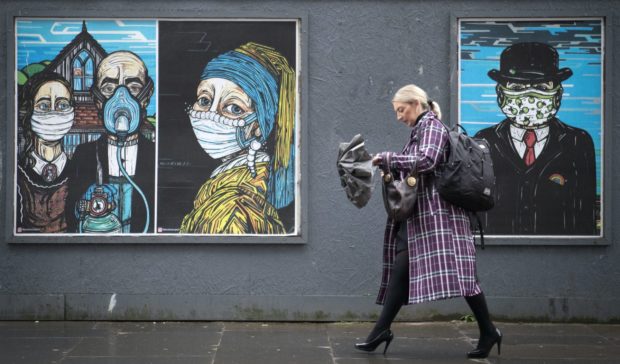Nicola Sturgeon has said there is “reason for optimism” that the UK Government could be persuaded to extend its job retention scheme – a move that could save 61,000 Scottish jobs in the first half of next year.
The first minister said it would be a “good and sensible position” for the UK Chancellor Rishi Sunak to take, and suggested his promise to consider “creative and effective” ways to protect jobs could be a positive sign for furloughed workers.
Analysis from the Scottish Government’s chief economist, Gary Gillespie, found extending the scheme in Scotland for eight months would cost around £850 million but would protect 61,000 jobs.
The furlough scheme has supported 779,500 jobs north of the border, around 32% of the total workforce, since it was introduced and even with many employees now returning to work, around 217,000 jobs are still estimated to rely on the scheme.
The study found it would cost £10 billion for the protection to be extended to the end of June across the whole of the UK but argued this could provide better value for money than the current job retention bonus scheme.
It found even a temporary extension would have a “persistent, positive impact on the labour market, preventing unnecessarily higher levels of unemployment over the next few years”.
The Scottish Government has repeatedly urged the UK Government to use its borrowing powers to extend the furlough scheme beyond October and argued the latest findings mean the move would “pay for itself”.
The report states: “With Covid-19 cases on the rise, it may prove impossible for certain sectors to resume economic activity in a way that is economically viable before the current employment support schemes are due to expire in October 2020.
“Many of these businesses will have a viable long-term future, but only if they continue to be supported.
“This will help keep people in jobs while sectors of the economy currently unable to fully open recover and lead to sustained economic benefits at a relatively small cost.”
Speaking at the daily coronavirus briefing on Wednesday, Nicola Sturgeon repeatedly pointed to other nations with longer extensions, such as Germany to the end of 2021 and France to end June 2022.
Ms Sturgeon was asked whether there was a realistic prospect of the UK Government being persuaded to extend the scheme and what action she would take if it does come to an end next month.
“We don’t know if the UK Government is going to extend it,” Ms Sturgeon said.
“I don’t have the ability to read Rishi Sunak’s mind but the comments he made in the media sound as if there’s reason for optimism there, and I think that would be a good and sensible position to be in.
“We will always look at what more we can do but I come back to the point that the borrowing powers that fund the job retention scheme lie with the UK Government.
“We don’t have them so we can’t go and borrow the money to do this in Scotland because we don’t have the ability to do that.”
Ms Sturgeon also reiterated her calls for new borrowing bowers to be transferred to the Scottish Government if Westminster decides against extending the scheme.
The Scottish Government’s economy secretary, Fiona Hyslop, also highlighted the importance of the furlough scheme as it was confirmed Scotland’s economy had contracted 19.4% in the second quarter of the year.
GDP figures for April to June were released on Wednesday, highlighting the impact of the coronavirus lockdown. The UK economy shrank by 20.4% over the same period.
Ms Hyslop said she was hopeful Mr Sunak would listen to arguments around extending the furlough scheme, and early signs had been positive.
“There have been some overnight indications that the UK Government may look at things but to date they’ve said that they will end it at the end of October,” she said.
“But of course remember that’s what they also said immediately before the extension from June to October.
“We know the furlough scheme will have to end at some point but as we’ve indicated already, other countries are extending. Some of them as a blanket, some of them in specific sectors.”
Ms Sturgeon also used the daily briefing to call on the public to act now to prevent a rise in coronavirus deaths in the weeks ahead.
“Unless we act to stem community transmission now, it is highly likely that cases of serious illness and deaths will rise in the weeks to come,” she said.
“If community transmission continues to rise, as night follows day we will see more cases of people in hospital and unfortunately more cases of people dying.”
